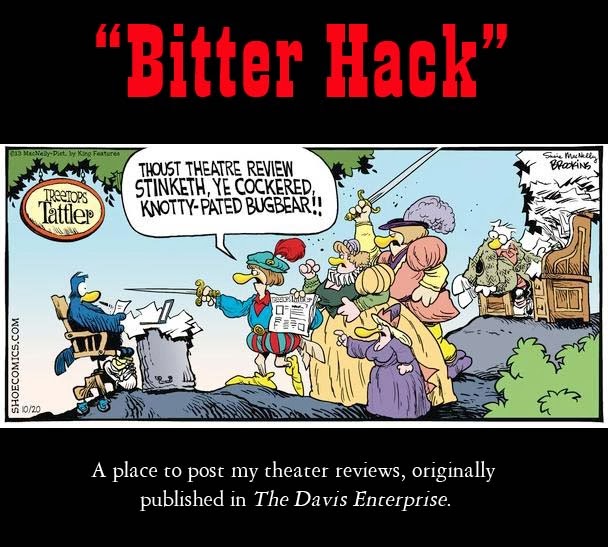 If a central theme runs through this year's THIRDeYE Theater Festival, taking place through this weekend at UC Davis' Wyatt Pavilion, it might be 'I see dead people.'
If a central theme runs through this year's THIRDeYE Theater Festival, taking place through this weekend at UC Davis' Wyatt Pavilion, it might be 'I see dead people.'Isaac - all three of him - sees his dead mother. Jaime sees his dead grandfather. Paul sees Hemingway and Hitler in a bathing suit.
This annual festival showcases the work of three undergraduate playwrights and three undergraduate directors, and allows the students to apply to the stage what they have learned in class. This year's festival is under the artistic curatorship of Peter Lichtenfels, and the plays themselves were developed in Philip Kan Gotanda's playwriting class in the fall quarter of 2008.
'The Blue Jay's Song,' written by Daniel Jordan and directed by William MacInnis, came out of the former's own romantic crisis; the play illuminates the rebirth that comes with the death of loved ones and the loss of relationships.
The character of Isaac is shown as a split personality, with Mark Curtis Ferrando as the central figure; Micah Shyuh and Juan Gallardo represent different portions of his emotions. Gallardo (Isaac 2) is the more angry, while Shyuh (Isaac 1) is the more peaceful and loving of the emotions.
Isaac lost his mother early, and his search to understand that loss has affected his life, especially his current relationship with Elizabeth (Monica Ammerman). The two fight and make up in confusing ways, the underlying cause not always apparent to the audience.
The circus atmosphere of Isaac's emotional life is represented by a ringmaster ('circus conductor') played by Jordan himself, accompanied by a juggler (Alexander Weston) and contortionist (Megan Vaughan). They're accompanied by dancers Sasha Hao, Jenny Giles and Elizabeth Tremain.
Malia Abayon plays the ghost of Isaac's mother; she gives an exceptional performance that adds depth to the production.
A lighting designer once told me that the key to good lighting design is that it be so seamlessly integrated into the action that it remains unnoticed. If that is the case, designer Robert Quiggle has some 'splaining to do, because his lighting choices are often odd; they left me wondering why he did such-and-such, rather than concentrating on the flow of the play itself.
Kristopher Ide's 'Fools Afloat' is directed by Olufunmilayo Alabi. This play also derived from the playwright's personal experience: in this case, the death of his father.
Brendan Ward gives an impassioned performance as a man struggling to come to grips with his father's death. This struggle takes him on an imagined boat ride with Ernest Hemingway (Christopher Mantione) and a unique vision of Adolf Hitler (Ryan Geraghty), in an old-fashioned bathing suit. (Kudos to costume designer Diego Suazo-Vacarezza.)
The cast also includes Gillian Heitmen, as Paul's girlfriend Francesca, and Thomas Barrack, as Francesca's former boyfriend John.
As Paul takes his imagined trip with Hemingway and Hitler, he pulls the unraveled bits of his life back together again; he's able to return with a greater understanding of himself and an ability to move forward in his relationship with Francesca.
Fourth-year psychology and dramatic art double-major Jazz Trice wrote and gives a very strong performance in 'Empty All the Boxes,' directed by Natasha Cooke.
Trice's character, Jaime, has been having visions of his grandfather as a young man (Gordon Meacham), and can't quite understand what this means. Jaime's attempt to share his experience with his sister, Nicki (the effervescent Sophiana Carrell), underlines the difficulties in their sibling relationship.
When their parents (Stephanie Moore and Kristopher Ide) return home, it becomes obvious that this family has a lot of relationship problems. Communication doesn't happen in this house. Can Grandpa's ghostly visits help break down walls when a potential health crisis erupts?
'This play drives and asks questions that are uncomfortable,' Cooke explains. 'It reveals reality and truth, and sheds humanity amongst those searching.'



